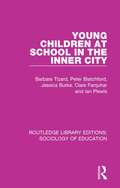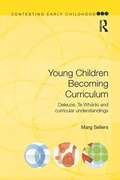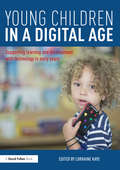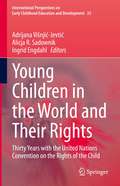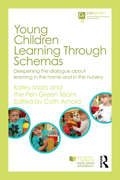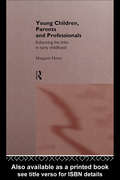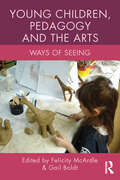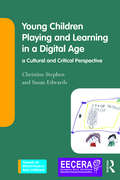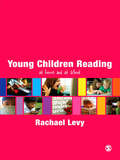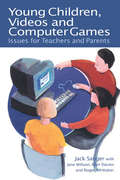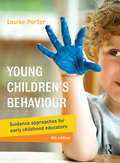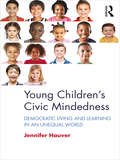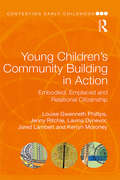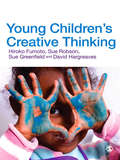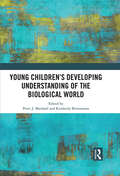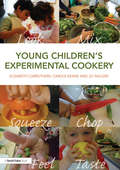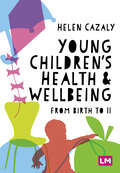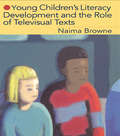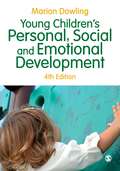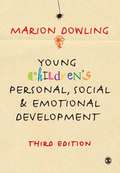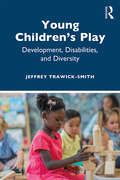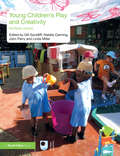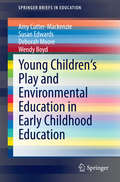- Table View
- List View
Young Children at School in the Inner City (Routledge Library Editions: Sociology of Education #55)
by Barbara Tizard Peter Blatchford Jessica Burke Clare Farquhar Ian PlewisFirst published in 1988, this work reports on a major British study of children’s progress and behaviour in 33 infant schools. The research looks at children from nursery through to junior school and asks why some children had higher attainments and made more progress than others. Using observations not only in schools but also interviews with children and parents, the children’s skills on entering school were found to have an important effect on progress. In each school, black and white children, and girls and boys were studied, in order gauge whether gender or ethnicity were related to progress.
Young Children Becoming Curriculum: Deleuze, Te Whāriki and curricular understandings (Contesting Early Childhood)
by Marg SellersThis book contests a tradition and convention in educational thinking that dichotomises children and curriculum, by developing the notion of re(con)ceiving children in curriculum. By presenting an innovative research project, in which she worked with children to share their understandings of the internationally renowned Te Whāriki curriculum, Marg Sellers explores what the curriculum means to children and how it works, as demonstrated in games they played. In generating different ways for thinking, the author draws upon her work with the philosophical imaginaries of Gilles Deleuze and Felix Guattari, whose ideas shape both the content and the non-linear structure of this book. Topics covered include: Rhizomes, rhizo-methodology and rhizoanalysis; Plateaus; De~territorialising lines of flight; Dynamic spaces; The notion of empowerment. This assemblage of Deleuzo-Guattarian imaginaries generates ways for thinking differently about children’s complex interrelationships with curriculum, and opens possibilities for re(con)ceiving – both reconceiving and receiving – children’s understandings within adult conceptions of how curriculum works for young children. This book will be of interest to early childhood students, scholars and practitioners alike, also appealing to those interested in philosophical, theoretical and practical understandings of curriculum in general.
Young Children in a Digital Age: Supporting learning and development with technology in early years
by Lorraine KayeYoung children are born into a digital world and it is not unusual to see preschool children intuitively swiping screens and confidently pressing buttons. There is much debate about the impact of the increased access to technology on young children’s health and wellbeing with claims that it damages their social skills and emotional development. This timely new textbook examines how developments in technology, particularly mobile and touch screen technology, have impacted on children’s lives and how when used appropriately it can support all aspects of their development. Clearly linking theory and research to everyday practice, the book offers guidance on: The role of technology in the early years curriculum Developing young children’s understanding of safe and responsible use of technology The role of the adult within digital play activities Using technology to enhance and develop young children’s creativity Technology and language acquisition Featuring a wide range of case studies and examples to show how the ideas described can be put into practice, this is essential reading for all early years students and practitioners that want to know how they can harness technology in a meaningful way to support young children’s learning and development.
Young Children in the World and Their Rights: Thirty Years with the United Nations Convention on the Rights of the Child (International Perspectives on Early Childhood Education and Development #35)
by Adrijana Višnjić-Jevtić Alicja R. Sadownik Ingrid EngdahlThis book provides different perspectives on the concept of children’s rights, including policy, educational, and children’s perspectives. It examines how the crucial ideas of the Convention on the Rights of the Child are respected and implemented in 14 countries in five regions of the world. It looks at early childhood education, children’s participatory rights, and at how these rights are promoted and guaranteed in different countries. It explores the professional practice of education and its complexities, challenges and dilemmas, as well as the role of play, and of listening and participation. The book advocates children’s rights today, arguing for its vital importance, in the best interests of the children. In doing so, it furthers the understanding of children’s rights and spreads knowledge about the Convention, as a means of celebrating its 30th anniversary. The UN Convention on the Rights of the Child (UNCRC) comprises the potential to change the lives of children to the very best. It may exalt children from the position of marginalized citizens to the centre of policies all over the world. Even though the concept of children’s rights is omnipresent, the respect for children’s rights must be discussed. While the Convention brings the new perspective of children as citizens to the world, there are still challenges in its application. The book interrogates challenges in understanding and applying children rights and offers possible answers to these challenges. The ratification process itself, does not guarantee that children’s rights are respected. While all adults should take responsibility for implementing the UNCRC in everyday life, Early Childhood Education should give opportunities for children to learn and live their rights.
Young Children Learning Through Schemas: Deepening the dialogue about learning in the home and in the nursery (Pen Green Books for Early Years Educators)
by Cath Arnold Katey Mairs The Pen Green TeamYoung Children Learning Through Schemas is a creative and highly engaging text that shows how young children can learn through exploring repeated patterns in their actions. With contributions from a range of practitioners, this book examines the philosophical approaches underpinning constructivism and includes a variety of case studies of small children in order to demonstrate the universal explorations we all engage in as human beings. This approach from the contributors, which involves presenting observations of one or two young children per chapter, is engaging, inspirational and yet rooted in every day practice. Chapters include a variety of observations of young children at home, in nursery and in groups with their parents or carers, which continue the dialogue about early years practice and the roles of families and professionals. Containing a wealth of illustrative photos, any practitioner researching or working in the area of Early Years education and care will find this book essential reading.
Young Children, Parents and Professionals: Enhancing the links in early childhood
by Margaret HenryAs early year education and very early child care increase, parents and professionals face many difficult questions. What are the effects of early education on children? Are parents fulfilling their roles? What should teachers' roles be? Seldom asked are more basic questions: What are the fundamental needs of young children? Or parents? Or professionals? How can these differing sets of needs be met?Margaret Henry proposes three dimensions of caregiving behaviour through which parents and professionals not only help young children to develop, but can also help one another's development. Evidence of positive change comes both from her own research in family day care and from the work of her students, practicing teachers and child care personnel. Their examples involve often hard-to-reach parents - those who are tired, employed, alienated, bossy and culturally and ethnically diverse. There are practical suggestions here for professionals and parents interested in enhancing their relationships with one another and the outcomes for young children.
Young Children, Pedagogy and the Arts: Ways of Seeing (Changing Images of Early Childhood)
by Felicity McArdle Gail BoldtYoung Children, Pedagogy and the Arts is an innovative text that describes practices and research that cross all five strands of the arts—visual, drama, music, dance, and media—and illuminates ways of understanding children and their arts practices that go beyond the common traditions. The book: - Offers practical and rich illustrations of teachers’ and children’s work based on international research that integrates theory with practice; - Brings a critical lens to arts education; - Includes summaries, reflective questions, and recommended further readings with every chapter. Young Children, Pedagogy and the Arts provides a more nuanced understanding of the arts through an exploration of specific instances in which committed teachers and researchers are discovering what contemporary multimodal tools offer to young children. Chapters contain examples of ‘doing’ the arts in the early years, new ways of teaching, and how to use emerging technologies to develop multiliteracies, equity, agency, social and cultural capital, and enhance the learning and engagement of marginalized children.
Young Children Playing and Learning in a Digital Age: a Cultural and Critical Perspective (Towards an Ethical Praxis in Early Childhood)
by Christine Stephen Susan EdwardsYoung Children Playing and Learning in a Digital Age explores the emergence of the digital age and young children’s experiences with digital technologies at home and in educational environments. Drawing on theory and research-based evidence, this book makes an important contribution to understanding the contemporary experiences of young children in the digital age. It argues that a cultural and critically informed perspective allows educators, policy-makers and parents to make sense of children’s digital experiences as they play and learn, enabling informed decision-making about future early years curriculum and practices at home and in early learning and care settings. An essential read for researchers, students, policy-makers and professionals working with children today, this book draws attention to the evolution of digital developments and the relationship between contemporary technologies, play and learning in the early years.
Young Children Reading: At home and at school
by Rachael LevyDeveloping and supporting literacy is an absolute priority for all early years settings and primary schools, and something of a national concern. By presenting extensive research evidence, Rachael Levy shows how some of our tried and tested approaches to teaching reading may be counter-productive, and are causing some young children to lose confidence in their abilities as readers. Through challenging accepted definitions and perspectives on reading, this book encourages the reader to reflect critically on the current reading curriculum, and to consider ways in which their own practice can be developed to match the changing literacy landscape of the 21st century. Placing the emphasis on the voices of the children themselves, the author looks at: - what it feels like to be a reader in the digital age - children's perceptions of reading - home and school reading - reading in multidimensional forms - the future teaching of reading Essential reading for all trainee and practising teachers, this critical examination of a vital topic will support all those who are interested in the way we can help future generations to become literate. This book will encourage researchers and practitioners alike to redefine their own views of literacy, and situate 'reading literacy' within the digital world in which young children now live.
Young Children, Videos and Computer Games: Issues for Teachers and Parents
by Jack Sanger Jane Wilson Bryn Davies Roger WhittakerDebate ranges over the effects of the growing utilization by the young of interactive screen-based technologies and the effects of these on vulnerable young chldren. This text is based on two years' research on 100 children, with entertainment screen technology in their homes, following them from home to school and examining the difference in culture in the two environments. The question is asked whether children are developing the necessary IT and other skills required from the maturing learner as we approach the 21st century. Issues such as gender, parenting, violence, censorship and the educational consequences of their screen-based experiences are at the forefront of the text's coverage.
Young Children's Behaviour: Guidance approaches for early childhood educators
by Louise Porter'The book provides a comprehensive, yet practical discussion of guidance strategies that can be implemented in a variety of situations. These strategies promote a respect for children and their rights, enhance children's self-esteem, and help to foster pro-social skills. This book is a must-read for both students and practitioners who work with children and families.' - Dr Laura McFarland, School of Education, Charles Sturt UniversityDrawing on the latest research evidence, Young Children's Behaviour outlines the beliefs and values that underpin the guidance approach to managing the behaviours of children from birth to eight years of age. In contrast with rewards-and-punishment systems, guidance believes that children do not need incentives to behave well, but instead need skills. Rather than punishing them for lacking skills, guidance teaches young children self-regulation skills so that they can behave considerately.The author provides practical strategies that both meet children's needs and safeguard the rights of surrounding adults and children. These methods include listening, being assertive, giving positive instructions, solving problems collaboratively, and coaching children to self-regulate their emotions and impulses. The text also offers advice on responding to many common challenges including separation distress, meltdowns, aggression, and social withdrawal. Finally, the book suggests how educators can provide educational and behavioural support for children with atypical development and describes how to foster effective relationships with parents whose children display challenging behaviours.Dr Louise Porter powerfully argues that behaviour guidance is the most effective approach to working with young children and reflects the deepest values of early childhood education and care.
Young Children’s Civic Mindedness: Democratic Living and Learning in an Unequal World
by Jennifer HauverYoung Children’s Civic Mindedness provides a well-grounded understanding of children’s civic thought and action by inviting readers to look and listen carefully to the voices of young children themselves. Grounded in research on children’s evolving civic identities and drawn from extended case studies and rich narrative vignettes, this book shows the many ways even the youngest children can be civic-minded and political. The book engages readers in thinking about the many ways children reason about and approach civic problems; how children’s experience in various local and larger contexts shapes their thinking and action; and the environmental factors that delimit what children see as possible in civic spaces. Written for early childhood, elementary and civic educators, this book encourages readers to go beyond mere rhetoric on the importance of civic education, to develop improved ways of teaching for children’s civic development.
Young Children's Community Building in Action: Embodied, Emplaced and Relational Citizenship (Contesting Early Childhood)
by Louise Gwenneth Phillips Jenny Ritchie Lavina Dynevor Jared Lambert Kerryn MoroneyRethinking the concepts of citizenship and community in relation to young children, this groundbreaking text examines the ways in which indigenous understandings and practices applied in early childhood settings in Australia and New Zealand encourage young children to demonstrate their care and concern for others and so, in turn, perceive themselves as part of a larger community. Young Children’s Community Building in Action acknowledges global variations in the meanings of early childhood education, of citizenship and community building, and challenges widespread invisibility and disregard of Indigenous communities. Through close observation and examination of early years settings in Australia and New Zealand, chapters demonstrate how practices guided by Aboriginal and Māori values support and nurture children’s personal and social development as individuals, and as citizens in a wider community. Exploring what young children’s citizenship learning and action looks like in practice, and how this may vary within and across communities, the book provides a powerful account of effective pedagogical approaches which have been long excluded from mainstream dialogues. Written for researchers and students of early childhood education and care, this book provides insight into what citizenship can be for young children, and how Indigenous cultural values shape ways of knowing, being, doing and relating.
Young Children's Creative Thinking
by David J Hargreaves Sue Robson Sue Greenfield Hiroko FumotoThe importance of promoting young children's creative thinking, and the social relationships which support it, is now seen as a vital element of good early childhood practice. The authors push forward our understanding of what young children's creative thinking is, and how it promotes young children's well-being. By drawing on research evidence, they examine key issues from the perspectives of the child, the parents or carers, and early childhood practitioners and make links between theory and practice. The book is divided into three key parts: - creative thinking, social relationships and early childhood practice - exploring perspectives in early childhood research - experiences of young children, parents and practitioners Chapters integrate practice, research and conceptual understanding to meet the needs of undergraduate and postgraduate students on any Early Childhood course.
Young Children�s Developing Understanding of the Biological World
by Peter J. Marshall Kimberly BrennemanThis book explores current research on young children’s beliefs and knowledge about the biological world – otherwise known as ‘folkbiology’. Contributors discuss factors that shape the development of folkbiological knowledge, as well as possible interventions designed to counteract cognitive biases that can interfere with the development of scientifically informed reasoning about natural phenomena. Taken together, the papers provide insights into the contributions of cognitive biases to the development of biological misunderstandings and into the life experiences and contexts that can contribute to or impede accurate learning of biological concepts. As part of a wider literature, the insights provided by the authors are relevant to the design of educational experiences that will foster children’s exploration and further their understanding of life science ideas.The chapters in this book were originally published as a special issue of Early Education and Development.
Young Children’s Experimental Cookery
by Elizabeth Carruthers Carole Keane Jo InglebyYoung Children’s Experimental Cookery encourages Early Years practitioners and teachers to take an innovative and creative approach to introducing young children to food and cooking. The book addresses wider issues such as healthy eating and food preparation skills, but also moves beyond the concept of traditional cookery lessons to celebrate food as a creative medium, offering immense scope for multi-sensory exploration and a variety of high quality learning experiences. Practitioners are encouraged to abandon recipes, take a step back, and afford children the freedom to chop, mix, stir and concoct their own creations, exploring fresh ingredients and experimenting with new tastes and smells along the way. Bridging the gap between food preparation and the development of confidence, imagination and creative-thinking skills, this open-ended approach to cooking sessions will equip children with skills which go far beyond those needed in the kitchen. Featuring full-colour photographs throughout, as well as detailed case studies and practical tips for various seasons and food groups, this accessible and exciting resource is ideal for practitioners, teachers, parents and budding chefs! Every school and Early Years setting should have at least one copy in their staff room.
Young Children′s Health and Wellbeing: from birth to 11
by Helen CazalyThis book supports those training to work with young children to explore the many factors that impact on child health and wellbeing. Health is a concept that is often taken for granted in young children. If a child is physically active, appears well and is succeeding in learning, it is assumed that all is well. The growing statistics of child mental health issues tell a different story, as do the statistics for childhood obesity and the increasing number of physical health issues in childhood. This book explores and evaluates the strategies currently used in Britain to tackle this escalating situation and asks - what more is needed? The global pandemic has created a large increase in all childhood issues – the scale of which is yet to be ascertained. Supporting healthy childhoods has always been, and always will be, a constantly evolving agenda. What supported children 10 years ago may no longer be relevant in today′s society.
Young Children′s Health and Wellbeing: from birth to 11
by Helen CazalyThis book supports those training to work with young children to explore the many factors that impact on child health and wellbeing. Health is a concept that is often taken for granted in young children. If a child is physically active, appears well and is succeeding in learning, it is assumed that all is well. The growing statistics of child mental health issues tell a different story, as do the statistics for childhood obesity and the increasing number of physical health issues in childhood. This book explores and evaluates the strategies currently used in Britain to tackle this escalating situation and asks - what more is needed? The global pandemic has created a large increase in all childhood issues – the scale of which is yet to be ascertained. Supporting healthy childhoods has always been, and always will be, a constantly evolving agenda. What supported children 10 years ago may no longer be relevant in today′s society.
Young Children's Literacy Development and the Role of Televisual Texts
by Naima BrowneExplores and analyses the ways in which very young children's developing literacy can be supported by their experience of watching TV and videos. This book addresses ways teachers can use children's experience of watching stories on video or TV to feed back into their own story-writing, reading, story-telling and role-play in the classroom. Explores areas specifically highlighted in the National Curriculum for English, and will benefit teachers developing their literacy teaching in light of the government Literacy Hour initiative.
Young Children's Personal, Social and Emotional Development
by Marion DowlingYoung children’s personal, social and emotional development is of central importance to all those working in the Early Years. Offering thought-provoking questions and practical suggestions to help readers to reflect on and develop their own practice, this fourth edition of Marion Dowling’s much-loved book has been fully updated to include: Expanded coverage of key topics including independent thinking, living and learning with others, and dispositions for learning A new chapter on ‘Vulnerable Children and Fragile Families’, with sections on identifying risk, talking to families, and safeguarding and protection Guidance for working with parents in every chapter Updated links to the EYFS and a focus on two year olds. This is essential reading for all Early Years students and practitioners, and anyone working with or caring for young children.
Young Children's Personal, Social and Emotional Development
by Marion Dowling`This timely book focuses on learning within the context of children's growing sense of self and their emotions. . . a book that should be easily available for all early years practitioners to consult' - Nursery World `Exudes a deep understanding of very young children. It fills the gap for early years practitioners in the core foundation stage area of personal, social and emotional development' - Times Educational Supplement `Considers how children's development can be assisted in ways that are responsive to their needs. It discusses how children develop confidence, independence, awareness of the needs of others and the disposition to learn. It also looks at the issues of emotional well-being, moral and spiritual developments and how children relate to the wider world. This is an essential read for those working in this area and anyone else with an interest in the current debate about early years provision' - Childright This book shows that personal and social development is essential to children's early learning. The kind of person we become colours all else that we do in life. But personal and social development must be supported by sensitive interventions from adults who understand children's needs. The author presents the theory and practice of personal and social development with young children, using everyday examples from early years settings. Drawing on her extensive experience in early years settings, Marion Dowling shows how children can be helped to develop confidence, social skills and independence, and how early years workers can contribute to this. Each chapter includes suggestions for early years practice as well as professional questions for consideration.
Young Children's Personal, Social and Emotional Development
by Ms Marion DowlingYoung children's personal, social and emotional development is an area of ever-increasing interest to those working in the field of early childhood. This fully revised fourth edition of Marion Dowling's much-loved book has been updated to include: Current policies and frameworks, up-to-date research references and revised case studies Coverage of Troubled Families and 'Vulnerable Children', with sections on identifying risk, talking to families and safeguarding and protection A revised final chapter considering different methods of supporting children Updated links to EYFS and Teaching Standards (Early Years} and a focus on two year olds New guidance for working with parents Online material including links to journal articles and a video interview with the author With thought-provoking questions and practical suggestions to help readers to reflect on and develop their own practice, this book is essential reading for all Early Years students and practitioners.
Young Children's Play: Development, Disabilities, and Diversity
by Jeffrey Trawick-SmithYoung Children’s Play: Development, Disabilities, and Diversity is an accessible, comprehensive introduction to play and development from birth to age 8 years that introduces readers to various play types and strategies and helps them determine when intervention might be needed. Skillfully addressing both typically developing children and those with special needs in a single volume, this book covers dramatic play, blocks, games, motor play, artistic play, and non-traditional play forms, such as humor, rough and tumble play, and more. Designed to support contemporary classrooms, this text deliberately interweaves practical strategies for understanding and supporting the play of children with specific disabilities (e.g. autism, Down syndrome, or physically challenging conditions) and those of diverse cultural backgrounds into every chapter. In sections divided by age group, Trawick-Smith explores strategies for engaging children with specific special needs, multicultural backgrounds, and incorporating adult–child play and play intervention. Emphasizing diversity in play behaviors, each chapter includes vignettes featuring children’s play and teacher interactions in classrooms to illustrate core concepts in action. Filled with research-based applications for professional practice, this text is an essential resource for students of early childhood and special education, as well as teachers and coaches supporting early grades or inclusive classrooms.
Young Children’s Play and Creativity: Multiple Voices
by Natalie Canning Linda Miller Gill Goodliff John ParryThis book draws on the voices of practitioners, academics and researchers to examine young children’s play, creativity and the participatory nature of their learning. Bringing together a wide range of perspectives from the UK and internationally, it focuses on the level of engagement and exploration involved in children’s play and how it can be facilitated in different contexts and cultures. This new reader aims to challenge thinking, promote reflection and stimulate further discussion by bringing together research and practice on play and creativity. Divided into two parts, Part I is written by researchers and academics and explores key themes such as creative meaning making, listening to children’s voices, risk and spaces, children’s rights, play and technology. Part II is authored by Early Childhood professionals and reveals how practitioners have responded to the issues surrounding play and creativity. Each chapter is contextualised by an introduction to highlight the key points and a list of follow-up questions is also included to encourage reflection and debate. Drawing on the wide-ranging writing of academics, practitioners and researchers, this book is an invaluable resource for students, practitioners and all those who are interested in the essence of play and creativity, what it means for children, and the far-reaching benefits for their well-being, learning and development.
Young Children's Play and Environmental Education in Early Childhood Education
by Amy Cutter-Mackenzie Susan Edwards Deborah Moore Wendy BoydIn an era in which environmental education has been described as one of the most pressing educational concerns of our time, further insights are needed to understand how best to approach the learning and teaching of environmental education in early childhood education. In this book we address this concern by identifying two principles for using play-based learning early childhood environmental education. The principles we identify are the result of research conducted with teachers and children using different types of play-based learning whilst engaged in environmental education. Such play-types connect with the historical use of play-based learning in early childhood education as a basis for pedagogy In the book 'Beyond Quality in ECE and Care' authors Dahlberg, Moss and Pence implore readers to ask critical questions about commonly held images of how young children come to construct themselves within social institutions. In similar fashion, this little book problematizes the taken-for-grantedness of the childhood development project in service to the certain cultural narratives. Cutter-Mackenzie, Edwards, Moore and Boyd challenge traditional conceptions of play-based learning through the medium of environmental education. This book signals a turning point in social thought grounded in a relational view of (environmental) education as experiential, intergenerational, interspecies, embodied learning in the third space. As Barad says, such work is based in inter-actions that can account for the tangled spaces of agencies. Through the deceptive simplicity of children's play, the book stimulates deliberation of the real purposes of pedagogy and of schooling. Paul Hart, University of Regina, Canada
